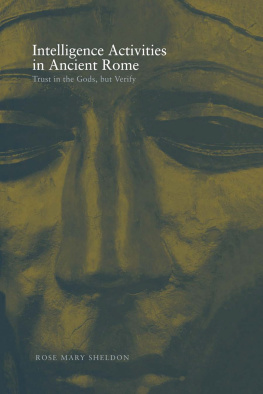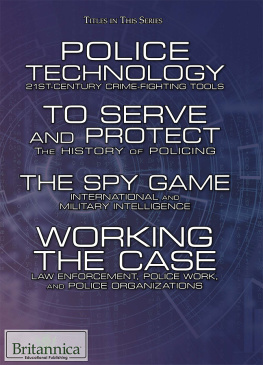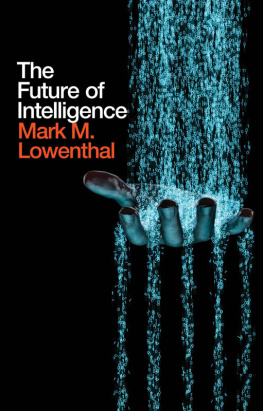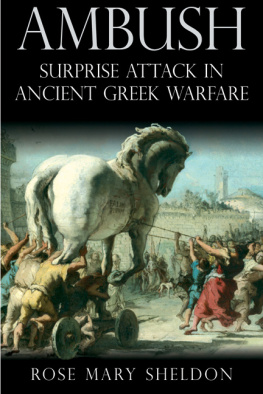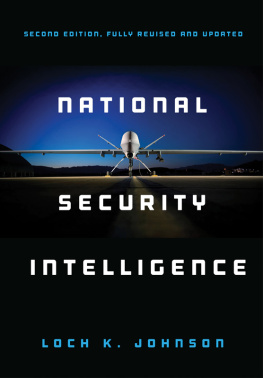
Intelligence Activities in Ancient Rome
Intelligence activities have always been an integral part of statecraft, and the Romans could not have built and protected their empire without them. In both the Republic and the Empire the Romans realized that to keep their borders safe, to control their population, to keep abreast of political developments abroad, and for the internal security of their own regime, they needed a means to collect the intelligence which enabled them to make informed decisions. What are referred to as intelligence activities, in fact, include a whole range of subjects that are only loosely bound by the fact that modem intelligence services practice those arts. Professor Sheldon uses the modem concept of the intelligence cycle to trace intelligence activities whether they were done by private citizens, the government, or the military. The range of activities is broad: intelligence and counterintelligence gathering, covert action, clandestine operations, the use of codes and ciphers, and many other types of espionage tradecraft have all left their traces in the ancient sources. This book will certainly dispel the myth that such activities are a modem invention.
Rose Mary Sheldon has been a professor at the Virginia Military Institute since 1993. She received a PhD from the University of Michigan in ancient history in 1987 and has published widely on ancient history.
Intelligence Activities in Ancient Rome Trust in the Gods, but Verify
Rose Mary Sheldon

First published 2005
by Routledge
2 Park Square, Milton Park, Abingdon, Oxon, OX14 4RN
Simultaneously published in the USA and Canada
by Routledge
605 Third Avenue, New York, NY 10017, USA
Routledge is an imprint of the Taylor & Francis Group, an informa business
2005 Rose Mary Sheldon
All rights reserved. No part of this book may be reprinted or reproduced or utilised in any form or by any electronic, mechanical, or other means, now known or hereafter invented, including photocopying and recording, or in any information storage or retrieval system, without permission in writing from the publishers.
The publisher makes no representation, express or implied, with regard to the accuracy of the information contained in this book and cannot accept any legal responsibility or liability for any errors or omissions that may be made.
British Library Cataloguing in Publication Data
A catalogue record for this book is available from the British Library
Library of Congress Cataloging in Publication Data
A catalog record for this book has been requested
ISBN10: 0714654809 (hbk)
ISBN10: 0415452716 (pbk)
ISBN13: 9780714654805 (hbk)
ISBN13: 9780415452717 (pbk)
DOI: 10.4324/9780203005569
Publishers Note
The publisher has gone to great lengths to ensure the quality of this reprint but points out that some imperfections in the original may be apparent
In Memoriam
Chester and Gretchen Starr
Maps and illustrations
Maps
Illustrations
Foreword
Some 2,000 years ago a Chinese Taoist thinker named Sun Tzu produced a small but immensely influential book, The Art of War (trans. 1991). Its final, thirteenth chapter carries the title On the Use of Spies. It begins with a statement: what enables an intelligent government and a wise military leadership to overcome others and achieve extraordinary accomplishments is foreknowledge, which cannot be gotten from ghosts and spirits, cannot be had by analogy, cannot be found out by calculation. It must be found out from people, people who know the conditions of the enemy. Tzu goes on to discuss the five kinds of spy, the various channels through which a commander can learn the strength, position, and intentions of the enemy, and, equally important, the extent of his knowledge or ignorance of the strength, position, and intentions of his adversary.
At about the same time, in Europe, Romes first emperor, Octavian, who had assumed the name Augustus, was engaged in putting on a sounder basis the rather haphazard system of gathering military intelligence in use during the centuries in which the Roman Republic had step by step extended its authority over Italy, Spain, North Africa, Greece, and the Middle East. Some of the methods used by the Republic to acquire foreknowledge in earlier times interpretation of the movements of flocks of birds, inspection of the livers of sacrificed animals, observation of the feeding habits of the sacred chickens, consultation of oracles sound like those specifically ruled out by Sun Tzu ghosts and spirits. But even secular methods of gaining foreknowledge were in those times primitive compared to those available to modem intelligence officers. There were no telephones to be used (and tapped), no radio messages sent by clandestine radio operators planted in enemy territory to be intercepted (and, if possible) deciphered, no ciphers, for that matter, none of the equipment of the modem agent onetime pad, silk, and cyanide. (Julius Caesar had a cipher, a simple letter transposition system, but he seems to have used it only in his private correspondence.)
The collection and transmission of military intelligence was almost exclusively by word of mouth. Military scouting parties reported to their commander, prisoners answered their interrogators, and travelers, merchants and diplomatic personnel passed on what they had learned about foreign territories. Under the Republic there was no central staff or center for the reception and classification of such data, and because the two consuls, the supreme executives in peace and war, changed every year, there was no continuity in its collection and interpretation. This discontinuity made the Republic vulnerable, and in the course of its steady climb to mastery of the ancient world it suffered some spectacular disasters due to its faulty or indeed total lack of foreknowledge. Professor Sheldon discusses some of these in detail. The most striking is the mishandling of the threat posed to the Republic by the operations of the Carthaginian general, Hannibal, in Spain. When the Romans finally declared war, one consul was on the way to Spain via the Greek city of Massilia (Marseilles), a Roman ally, and the other was preparing for an expedition against Carthage when the news came that Hannibal had crossed the Rhone and was coming down through the Alpine passes into northern Italy. Time and again in the following years he defeated the Romans, taking them by surprise, though in the end he had to return to Carthage, where he lost the battle and the war.
Professor Sheldons fascinating book covers the story of Roman military intelligence, its successes and its many failures, from the early days of the Republic to the year ad 284, which saw the beginning of the transformation of the Roman Empire under Diocletian into an oriental monarchy. She is a professor of history (and a colonel) at the Virginia Military Institute, where she has taught a course in this subject for many years and published more than two-dozen articles on it in professional journals. This book is a distillation of what she has written and taught over the years; though the notes give full references to sources and deal with matters of scholarly controversy, the text of the book is aimed at the general reader.
The account of the development of Roman intelligence methods from an embryonic form under the Republic to a fully developed system under Augustus and his successors is enlivened by separate chapters on some of Romes failures in the field. In addition to a chapter on Hannibal and his brilliant use of informants, there is one on Caesars two incursions into Britain, which after careful analysis comes to the conclusion that they would have been much more successful had he made a better preliminary study of the target area. In a later chapter, however, Sheldon discusses Caesars measures, in both the Gallic and civil wars, to improve intelligence communications, including a messenger system with relay horses stationed at fixed points, a prototype of the rapid communications system later organized by Augustus. Another deals with one of the Republics most disastrous defeats, the destruction of the army of Marcus Licinius Crassus, the millionaire triumvirate partner of Caesar and Pompey, when he invaded Parthia. But Augustus too, in spite of his centralization and reorganization of the intelligence system, was to suffer a disaster due to a lack of foreknowledge the annihilation of three legions commanded by Quinctilius Varus in the Teutoburg Forest in Germany in ad 9. At a time of apparent peace on the Rhine, Varus took his legions across the river to summer quarters among what seemed to be friendly German tribes. But when he moved, at summers end, to winter quarters, he was pinned down in a deadly ambush and his entire army, with all its possessions and dependents, was destroyed. In her detailed account of the disaster, Sheldon draws on the results of recent excavations, which have definitively located the site of the battle, uncovering large quantities of Roman artifacts. This event was certainly a failure of intelligence, but since the man who organized the ambush and steered the Romans into the trap, Arminius, was a German tribal leader who had seemed to be a friend of Rome, Varuss mistake is understandable.
Next page
